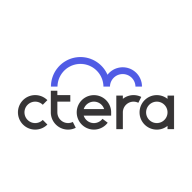

CTERA Enterprise File Services Platform and Dell PowerScale compete in the enterprise file storage and management category. CTERA stands out with flexible pricing and superior integration support in cloud environments, while Dell PowerScale excels in comprehensive features and high scalability, offering considerable infrastructure compatibility.
Features: CTERA delivers robust cloud integration, facilitating edge-to-core file sharing essential for distributed environments. It ensures data availability and seamless accessibility through a browser interface and edge filer with SMB or NFS access. In contrast, Dell PowerScale provides extensive scalability within IT frameworks, supporting high scalability with OneFS and integrated CloudIQ for performance monitoring. It features multi-protocol support, allowing simultaneous file access across different clients, enhancing data processing capabilities.
Room for Improvement: CTERA could enhance its scalability options for extensive data management and expand its integration capabilities with diverse IT infrastructure. Its real-time data processing could also be improved for better performance in high-demand environments. Dell PowerScale may focus on simplifying deployment and configuration processes, reducing complexity for users. Enhancing flexibility in data placement for evolving workloads and maintaining minimal downtime during upgrades would further benefit users.
Ease of Deployment and Customer Service: CTERA offers a streamlined deployment process with robust customer support, making configuration and integration efficient. Dell PowerScale, though requiring more intricate setup due to its expansive feature set, provides significant support that aids smooth deployment within larger systems, ensuring effective use of resources during rollouts.
Pricing and ROI: CTERA’s adaptable pricing model offers higher short-term ROI for smaller installations due to lower upfront costs, appealing to budget-sensitive enterprises. Dell PowerScale requires a more significant initial investment yet justifies it with long-term ROI attributed to its scalability and feature richness. Organizations seeking sustained investment returns will find Dell PowerScale’s comprehensive capabilities advantageous.
Adding SSD storage to Windows file servers is expensive, and we no longer need to back up those devices.
I am positive that CTERA has helped reduce the total cost of ownership by eliminating the need for manual storage management and reducing storage service processes.
Despite being more expensive than Huawei, it is stable and most enterprises accept the price due to its stability.
In terms of Dell PowerScale (Isilon) specifically, we have seen a return on investment due to faster performance than our last few storage arrays, and the general usability is a lot better.
The second cluster of Dell PowerScale (Isilon) gives us flexibility for small things like code upgrades, all the way to scenarios where we have lost this data center or data, allowing us to check if data is still intact on the other side.
They swiftly address concerns and take ownership of the call, providing a very satisfactory support experience.
High-priority issues are handled promptly.
I would rate their support a ten out of ten.
Support online is definitely a ten out of ten.
Dell provides support within four hours, and they always fulfill their promises.
They have managed previous issues well.
If we need to upgrade CPU and memory, we should be able to do that without a license upgrade.
CTERA is a very scalable product, allowing us to grow.
It offers good scalability options, including vertical and outward scalability.
We started on PowerScale with around about 300 terabytes and are now two and a half petabytes, still on the same file system.
That's really saved us in certain areas as we didn't have funding to expand Dell PowerScale (Isilon) until next year, which is why we utilized the cloud pools functionality to offload.
Dell PowerScale is highly scalable, as evidenced by the reduced physical hardware and the efficient use of rack space.
It has been pretty stable since then.
We had things deployed for years, and we were suddenly getting cloud sync issues that were crashing our sites.
It is very stable and reliable.
Since we have good protection levels, the data is secured and replicated across the disks.
I assess the stability and reliability of Dell PowerScale (Isilon) as perfect.
I find the product to be resilient and stable. There's no downtime and no crashes.
AI and automation features could enhance the platform, such as AI-powered search, predictive storage analytics, and intelligent alerts for proactive monitoring.
It would help to have a global single-pane-of-glass view of all my CTERA devices.
One suggested improvement for the CTERA Enterprise File Services Platform is the ability to distribute data across multiple active backend storage nodes rather than the current limitation of a single active node.
Hardware failures under warranty should be addressed within the promised timeline.
I would want to see more AI features with Dell PowerScale (Isilon).
If I could improve one thing on Dell PowerScale (Isilon), it would be better object storage as it recently breached into S3, and that capability could be broadened.
Unlike other solutions that require hardware purchases, CTERA offers software licensing with flexibility across multiple infrastructure providers.
CTERA's pricing seems to be on par with some of the other players, such as Nasuni and Azure.
I find the pricing reasonable.
It's quite expensive for the amount of storage we have.
My experience with pricing, setup costs, and licensing for Dell PowerScale (Isilon) shows it's a premium platform, so it's a big amount of money.
The pricing is excellent.
As soon as something is written to the device, CTERA copies it to the cloud, where it's versioned with snapshots so we can recover it.
A vital advantage of this platform is its instantaneous recovery capability, allowing seamless access to a secondary gateway if the primary one fails.
It is a three-in-one solution for us. It is a file-sharing platform, an archiving solution, and also a backup solution.
Dell PowerScale offers high scalability and stability as well, making it a valuable solution for enterprises.
In our AI initiatives, Dell PowerScale (Isilon) plays a significant role in data analysis, data fusion; principally, it is involved in data analysis, data extraction, and statistical analysis.
Single files are limited to four terabytes in our configuration, however, the system can support up to 16 terabytes, so we can scale based on that too.


The CTERA Enterprise File Services Platform provides a cloud-native global file system over public and private object storage, revolutionizing the world of hybrid cloud data solutions. Enhanced by a rich data services ecosystem, CTERA enables enterprises to gain full control of their data for optimal edge performance, data insight, and governance. The platform focuses on security, providing features like data encryption, access controls, and ransomware protection. Centralized management tools enable efficient data control and monitoring. The platform is being used to replace legacy NAS and file servers, especially at remote locations, and simplify backup and disaster recovery of file data while providing the flexibility of multi-cloud deployments with infinite scalability. CTERA is at the core of hybrid cloud transformations of some of the world’s largest banks, healthcare organizations, global media groups, and government agencies, in deployments that scale to tens of petabytes.
Dell EMC PowerScale (Isilon) storage solutions are designed to help manage data for enterprises of all types. Dell PowerScale systems are simple to install, manage, and scale to virtually any size and include a choice of all-flash, hybrid, or archive nodes. Dell PowerScale solutions stay flexible and reliable no matter how much storage capacity is added, how much performance is required, or how business needs change in the future.
With Dell PowerScale, your data lake always stays simple to manage, simple to grow, simple to protect, and simple enough to handle the most demanding current and future workloads.
Ideal for companies of any size, from small enterprises to multi-national ones, Dell PowerScale storage provides secure collaboration, modular scalability, flexible consumption models, and easy cloud integrations, all with management tools spanning multiple platforms.
Key Benefits of Dell EMC PowerScale Storage
Reviews from Real Users
Dell EMC PowerScale storage stands out among its competitors for a number of reasons. Two major ones are its scalability capabilities and its user-friendly centralized management system.
Rachel B., a chief operations officer & acting CFO at Like a Photon, writes, "PowerScale allows us to manage storage without managing RAID groups or migrating volumes between controllers. It has really simplified things. We're not having to worry about the underlying infrastructure. That takes care of itself. We just worry about the data. It's really easy for deploying and managing storage at the petabyte scale."
Keith B., the director of IT at NatureFresh Farms, writes, "The single pane of glass for both IT and for the end-user is a valuable feature. On the IT side, I can actually control where things are stored, whether something is stored on solid-state drives or spinning drives... The single pane of glass makes it very easy to use and very easy to understand. We started at 100 terabytes, and we moved to 250 and it still feels like the exact same system and we're able to move data as needed."
We monitor all NAS reviews to prevent fraudulent reviews and keep review quality high. We do not post reviews by company employees or direct competitors. We validate each review for authenticity via cross-reference with LinkedIn, and personal follow-up with the reviewer when necessary.